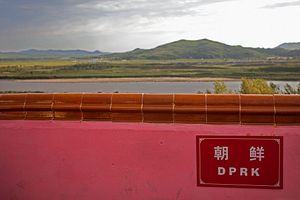“There is barely any food going into the country from China for almost two months now,” a missionary who clandestinely helps people in need inside North Korea told me last September. “There are so many more beggars, some people died from hunger in the border area and there’s no soap, toothpaste, or batteries.” Without AA batteries, households can’t even keep track of time, he said. Their clocks have died.
I research North Korea for Human Rights Watch. Under “normal” circumstances, I’d follow up communicating with recently escaped North Koreans, diplomats, aid workers, and the few journalists who sometimes get into the country. I’d try to piece together information and get glimpses of real life inside North Korea. I’d talk to sources who travel along border areas and other people with connections inside the country, working to corroborate or verify information from multiple angles.
Now this already tough job has gotten even harder, as North Korea’s leader, Kim Jong Un, appears to be taking advantage of the COVID-19 pandemic to entrench his already-firm grip on power.
New extreme measures his government has imposed may even be an attempt to return to ultra-strict controls in past decades, when the government controlled all information and the distribution of food and materials, while prohibiting “free market” activities. These conditions led to mass famine in the 1990s after the Soviet Union collapsed, and food supplies failed.
Early in 2020, North Korea became one of the first countries in the world to entirely shut its borders in the face of the COVID-19 pandemic. Officially, the government claims it has no recorded COVID-19 infections. But media outlets with sources inside North Korea reported accounts of COVID-like symptoms and deaths among soldiers, and possible outbreaks in the northern cities of Manpo and Chongjin.
Through the year, the government then intensified restrictions on communications with the outside world. Domestic travel is now almost entirely prohibited, and borders are more tightly controlled than ever, with the police ordered to “unconditionally shoot” on sight anybody in border areas, media outlets with sources inside North Korea reported.
The government has also imposed extreme measures on resident diplomats and international organization workers. It prohibited travel outside of Pyongyang and the receipt of diplomatic pouches. It has also put in effect quarantines of over a month for re-entry into the country. These measures have led all but three foreign aid workers to leave the country.
It has become increasingly difficult to learn the truth about what is happening to ordinary people, but there is little doubt that the situation is dire.
Official trade data provides a glimpse of the grim economic plight of the North Korean people. Trade with China in 2020 decreased by almost 81 percent, which came after already enormous drops in 2018, after the United Nations anti-weapons proliferation sanctions were expanded. The government dramatically reduced imports of staple foods and other necessities from China in August and stopped almost all imports, including all food and medicine, in October, claiming that COVID-19 can spread through migratory birds and animals, snow, and “yellow dust” blowing into the country from China. These shocks came alongside severe floods that hit the country between June and September, destroying crops, roads, and bridges — further undermining agricultural production.
In the face of what appears to be a mass humanitarian and food crisis, the North Korean government has repeatedly rejected offers of international aid. Meanwhile, the government has designated corruption and smuggling operations — which, while illegal, are essential to alleviate shortages — as “anti-socialist” and “enemy” behavior.
What can the international community do? As a starting point, the United States, European Union, Japan, South Korea, and other concerned governments should send a strong message to Kim Jong Un — and his backers in Beijing — that it is critical for Pyongyang to end restrictions on imports of food, medicine, and basic needs. The government urgently needs to allow emergency humanitarian aid, while permitting monitoring of distribution to ensure it is not diverted to the army or party officials, or used as part of its system of political repression.
The Biden administration is currently considering how to reset U.S. diplomacy toward North Korea. Officials should avoid past administrations’ myopic focus on nuclear weapons proliferation. A clear consensus has emerged among North Korea experts that the country’s weapons program is inextricably linked with human rights and humanitarian issues. As several member states have noted at the U.N. Security Council, one issue cannot be discussed without the others, and no future agreement will be successful or verifiable without steps by the government to cooperate with the U.N. system in general, including its human rights mechanisms.
Future negotiations with North Korea cannot be only about stemming weapons development but also need to focus on pressuring the government to take immediate and major steps to address the health, safety, and rights of its people. It is vitally important for the world to remember the people of North Korea, not just its nuclear weapons.

































